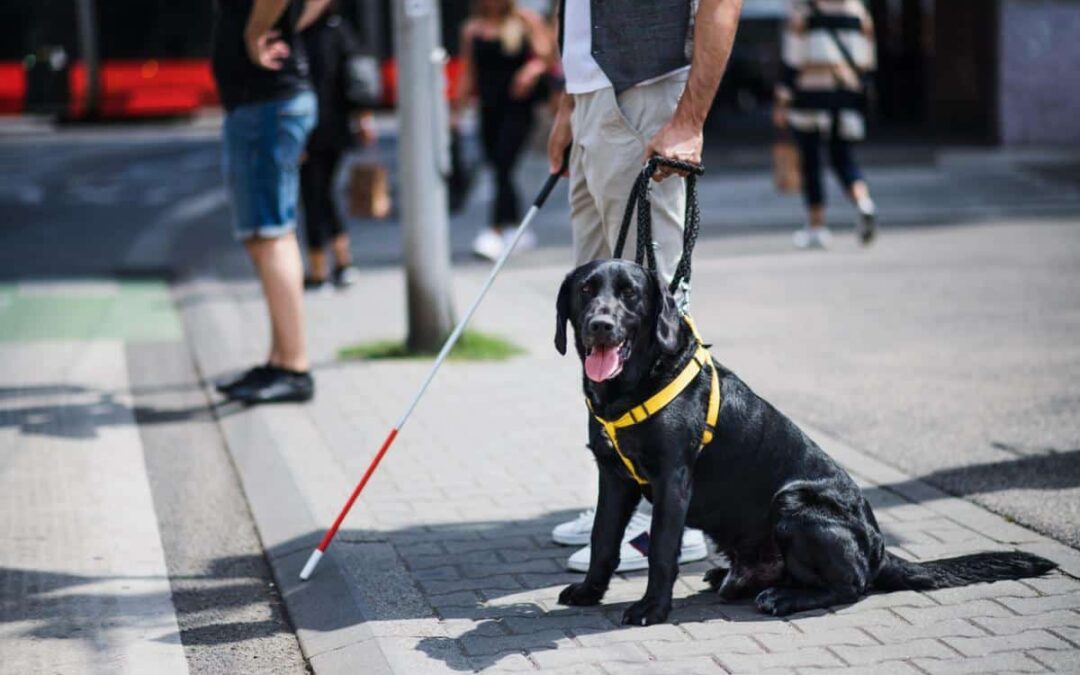Under the Americans with Disabilities Act (ADA), a “service animals” are dogs* with individual training to do work or perform tasks for a person with a disability. The ADA does not require that service animals be certified by a particular entity or wear identifying markers.
Qualifying for a Service Animal
There is no limit on the type of disability a person may have to qualify for a service animal. A person with a disability may have a service animal if there is a link between the task the animal performs and the disability.
For instance, a service animal may act as a guide for a person with a vision impairment or alert an individual with a hearing impairment to sounds. Service animals may also be trained to pick up and carry objects, provide balance assistance, and alert individuals to oncoming seizures.
The ADA does not classify emotional support animals as service animals. Emotional support, companion, comfort, or therapy animals provide comfort to a person just by being with them. Those animals are not trained to provide a specific job or task, so they do not qualify as service animals under the ADA.
Service Animals, Businesses, and the ADA
The ADA prohibits discrimination against individuals with disabilities by places of accommodation. Affected businesses include restaurants, hotels, stores, theaters, and sports venues. As a result, the ADA requires these businesses to allow individuals with disabilities to bring their service animals with them and into all public areas of the business premises. The ADA requires businesses to admit service animals, even if they do not generally allow pets.
Businesses may not ask to see a service animal’s identification or credentials, demand that the animal perform the task it is trained to do or inquire about the person’s disability. Businesses are limited to asking whether an animal is a service animal and what work or service the animal is trained to perform.
Furthermore, businesses may not ask an individual to remove a service animal except under the following circumstances:
- The presence of the animal fundamentally alters the goods, services, facilities, or accommodations of the business; or
- The animal poses a direct threat to the health or safety of others.
Service animal owners are solely responsible for their animals’ care. Businesses need not provide any additional accommodations for the animals.
Businesses also cannot charge the individual extra for the service animal. For example, a hotel that rents a room to an individual with a service animal cannot charge them an extra cleaning fee. However, the hotel could charge the individual if the service animal damages the hotel room.
Illinois State Laws and Service Animals
The Service Animal Access Act is a state law that also requires public places of accommodation to allow access to individuals with service animals. It adopts the same definition of “service animal” as the ADA. A knowing violation of the Service Animal Access Act is a Class C misdemeanor.
Likewise, the White Cane Law makes it a Class A misdemeanor for places of public accommodation to deny or interfere with the admittance of persons with vision impairments, hearing impairments, epilepsy and seizure disorders, and other physical disabilities with their support, guide, seizure-alert/response, or hearing dogs.
Under these laws, places of public accommodation also must allow service dog trainers to enter with service animals in training.
Call Rubin Law Today to See How We Can Help
Rubin Law is the only Illinois law firm to dedicate itself exclusively to providing compassionate legal services for children and adults with special needs. We offer unique legal and future planning techniques to meet your family’s individual needs.
Call us today at 866-TO-RUBIN or email us at email@rubinlaw.com to learn more about the services we can offer you and your family.
*In some cases, a service animal may be a miniature horse.

